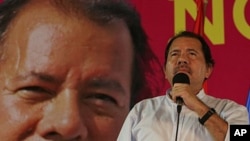Political disputes in Nicaragua have moved from the chambers of Congress to the streets, as supporters of President Daniel Ortega try to make up in violent protests what they lack in votes. The demonstrations are a clear effort to intimidate the democratic process and the checks and balances that underpin it. The government of Nicaragua should take all necessary steps to end the violence, and address political differences through peaceful discourse.
The demonstrators organized to keep lawmakers from voting to overturn a decree by the president that extends indefinitely the terms in office of certain government officials whom Ortega's opponents fear will help him unfairly win re-election next year. These fears followed a controversial ruling by some members of the Supreme Court to throw out a constitutional ban against Ortega running for another term. When pro-Ortega justices refused to step down after their terms expired earlier this month, pro-government protestors gathered at the court to prevent their removal.
There will always be disagreements between the branches of government in a democracy. What distinguishes a democratic government are the constitutional limits that keep the branches in balance. In these violent protests in Nicaragua, with demonstrators burning cars and firing homemade rockets on a hotel where lawmakers were meeting, respect for the constitution in Nicaragua has been cast aside and the rule of law ignored.
The United States is not alone in expressing concerns about the situation in Nicaragua. The Archbishop of Managua Monsignor Leopolo Brenes, civil society organizations, the business community, and international non-governmental organizations, have all spoken out against the riots. Jose Miguel Insulza, Secretary General of the Organization of American States, has appealed for calm, stressed the need to respect democratic institutions and offered OAS assistance to help resolve the crisis.
The continued disruption of the national assembly’s normal processes and violence against opposition legislators serve only to weaken the functioning of institutions that are vital to Nicaraguan democracy.
Supporters of President Daniel Ortega try to make up in violent protests what they lack in votes.




